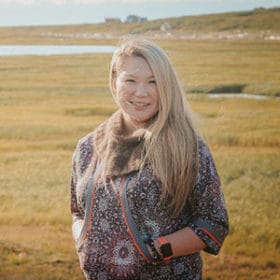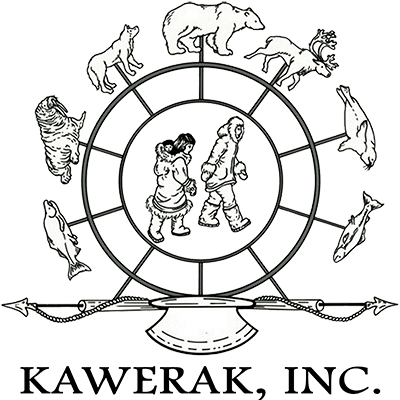Can you share an interesting, fun fact about yourself?
While raising four children, working full time, and going to school full time I was able to complete my AAS degree in three short semesters. Sometimes taking 20 credits a semester. It is amazing what we can do when you have passion and motivation to achieve your goals!
What drew you to the Caleb Scholars Program? Do you have a personal story about meeting Caleb, connection to his story, or family connection?
I was drawn to the Caleb Scholars Program to increase my knowledge regarding marine conservation and culture awareness to strengthen my leadership capacity for Rural and Indigenous communities in Alaska.
I feel a strong culture identity that was built around marine life along with our important traditional values of subsisting since I grew up spending summers in my parent’s hometowns, Shishmaref and Wales. My biggest passion in life is Tribal Government and the positive future narrative of rural communities. My motivation is to help ensure a better future for our Bering Strait region’s Tribal members, communities, and children so that future generations can preserve our Inuit subsistence activities and natural resources.
What does marine conservation mean to you? How do you engage with marine conservation at school and/or at home?
Marine conservation means to me: protecting the world’s oceans through science and advocacy along with inspiring the next generation of environmental stewards in which it will protect our Inupiaq culture and our subsistence resources.
What are your future educational and career goals? What are the top three things that are moving you toward those goals?
Once I finish my Bachelor’s in Rural Development, I plan to apply to UAF’s One Health Program which is a master’s degree program designed for previous Tribal Management students. I believe this work will have a positive impact for our people in our region because the One Health degree program recognizes the interdependence of human, animal and environmental health along with a holistic approach to the well-being of all in which I believe it will lead to improved health outcomes and enhanced resilience for our traditional ways of life here in Rural Alaska.
My top three motivators for achieving these goals are the health and wellbeing of children and their future, serving our people in our region to the best of my ability and making sure our elders are taken care of, in which I believe are important values of our culture and way of life.
Can you share a memorable story from your past when you felt a relationship to the ocean or waterways?
The summer after I graduated high school, I visited my dad’s village of Kigiqtaq Shishmaref for a quick trip before having to spend the college semester in the city. My dad wanted to take me to our camp. To get to our camp you have boat through the ocean. On the way back from camp the weather turned and was stormy. We had attempted twice to try and go back to Shishmaref but the waves were just too choppy. I was so terrified. We unexpectedly ended up having to stay at camp for several extra days until the ocean had calmed down. I’ll never forget my experience of riding in a small wooden boat with huge waves crashing on us. It had taught me that the ocean is an unpredictable force and it is always important to respect mother nature. We can’t control Siḷa the weather, and what mother nature does, but we can control how we can protect our oceans, marine life and how we react to climate change. Our people are the first stewards of our land. We must take care of our land so it can take care of us and our children and children’s children.

